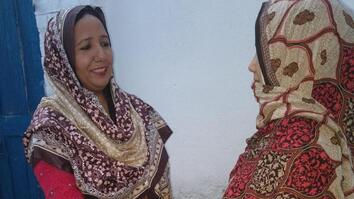PESHAWAR -- A growing number of female voters and candidates from the erstwhile Federally Administered Tribal Areas (FATA) are expected to turn out for elections on July 20 for seats representing the newly merged districts in the Khyber Pakhtunkhwa (KP) Assembly.
The election will give representation to the former tribal areas for the first time in the Assembly following the 2018 merger of FATA with the province.
The election originally was slated for July 2 before the Election Commission of Pakistan delayed it at the request of the provincial government.
About 2.7 million voters, of whom about 1 million are women, are eligible to exercise their right to vote in the upcoming elections. Bajaur has the highest number of eligible voters with 522,480, followed by 519,290 voters in Khyber District.
![Supporters June 20 in Khyber District sprinkle rose petals on ANP candidate Naheed Afridi (centre) as she campaigns for votes. Afridi is running to represent PK-106. [Shahbaz Butt]](/cnmi_pf/images/2019/06/21/18626-pak1-585_329.jpg)
Supporters June 20 in Khyber District sprinkle rose petals on ANP candidate Naheed Afridi (centre) as she campaigns for votes. Afridi is running to represent PK-106. [Shahbaz Butt]
![PK-106 candidate Naheed Afridi (2nd right) addresses voters in a hujra in Jamrud, Khyber District, June 20. [Shahbaz Butt]](/cnmi_pf/images/2019/06/21/18627-pak2-585_329.jpg)
PK-106 candidate Naheed Afridi (2nd right) addresses voters in a hujra in Jamrud, Khyber District, June 20. [Shahbaz Butt]
Direct elections will take place for 16 general seats, while the four reserved seats for women and one for minorities will be filled through proportional representation of the number of general seats won by a political party.
A total of 30 female candidates are running for the four reserved seats. They include women from North and South Waziristan, Kurram, Orakzai, Khyber, Mohmand and Bajaur districts and six former subdivisions of FATA.
Three women are also running for general seats, with one each in Khyber, Mohmand and Orakzai tribal districts. Nine candidates, including one female, have submitted nomination papers for the one seat reserved for minorities.
The Awami National Party (ANP) is fielding one of the female candidates who will contest the general seat for Khyber District.
"The ANP is proud to have fielded a female party worker, Naheed Afridi, from PK-106 as its candidate for the upcoming elections in the tribal districts of KP," Aimal Wali Khan, the provincial president of the party, said in a statement.
Encouraging women
"I will work for the welfare of women and the general public, especially in the sectors of education and health," Suria Khan, a Jamiat Ulema-e-Islam (Fazl) (JUI-F) candidate from the Landi Kotal subdivision of Khyber District, said in a video message.
She asked the women of the tribal areas to fully participate in the election process.
Social and cultural norms had previously barred from women from voting in KP and in Pakistan in general.
"It's encouraging that female candidates have been allotted tickets and that they will compete" for seats directly and also for the reserved seats from the tribal areas, Neelam Gigiani, a senior politician of the Qaumi Watan Party, said in an interview.
Still, more female candidates should have received tickets for the upcoming elections and officials should make more efforts to encourage women to vote, she said.
"It will take some time to bring more women into politics and parliament from the tribal areas," Gigiani said.
More parties should have fielded female candidates for general seats and from areas where they have a good voting bank, she said.
"I hope to see more women coming into parliament from the erstwhile FATA and more of them casting their votes," Gigiani said.
"The entire process is a great milestone for residents of the former FATA," said Hakim Khan Shinwari, a 45-year-old trader from Landi Kotal in Khyber District.
"This will be the first time ever that women from tribal districts get representation in parliament through reserved and general seats," Shinwari said.

![A polling worker in Peshawar marks a female voter's thumb after she voted in the general election last July 25. More women than before are expected to run for KP Assembly seats on July 20. [Javed Khan]](/cnmi_pf/images/2019/06/21/18594-female_voter-585_329.jpg)






